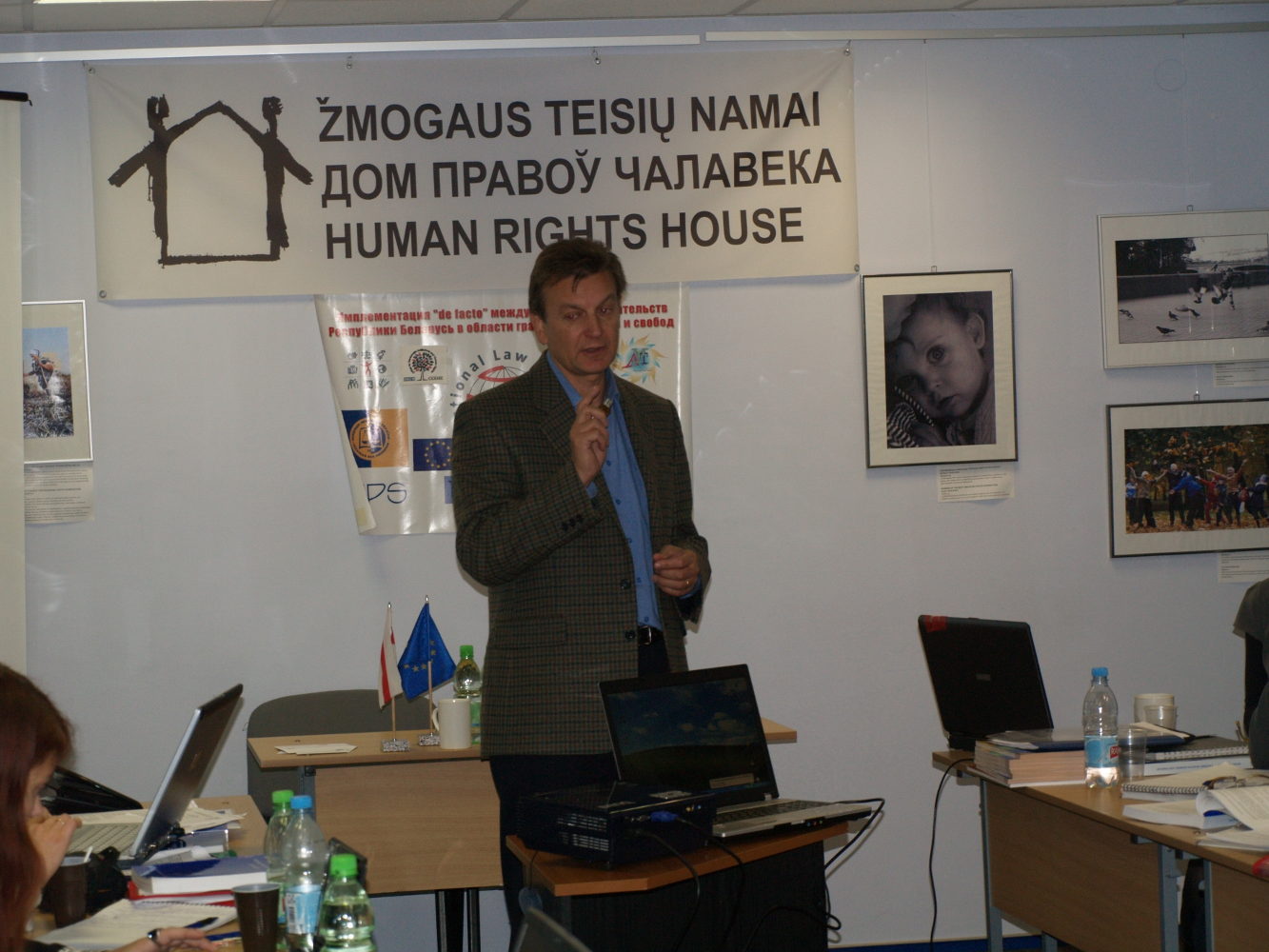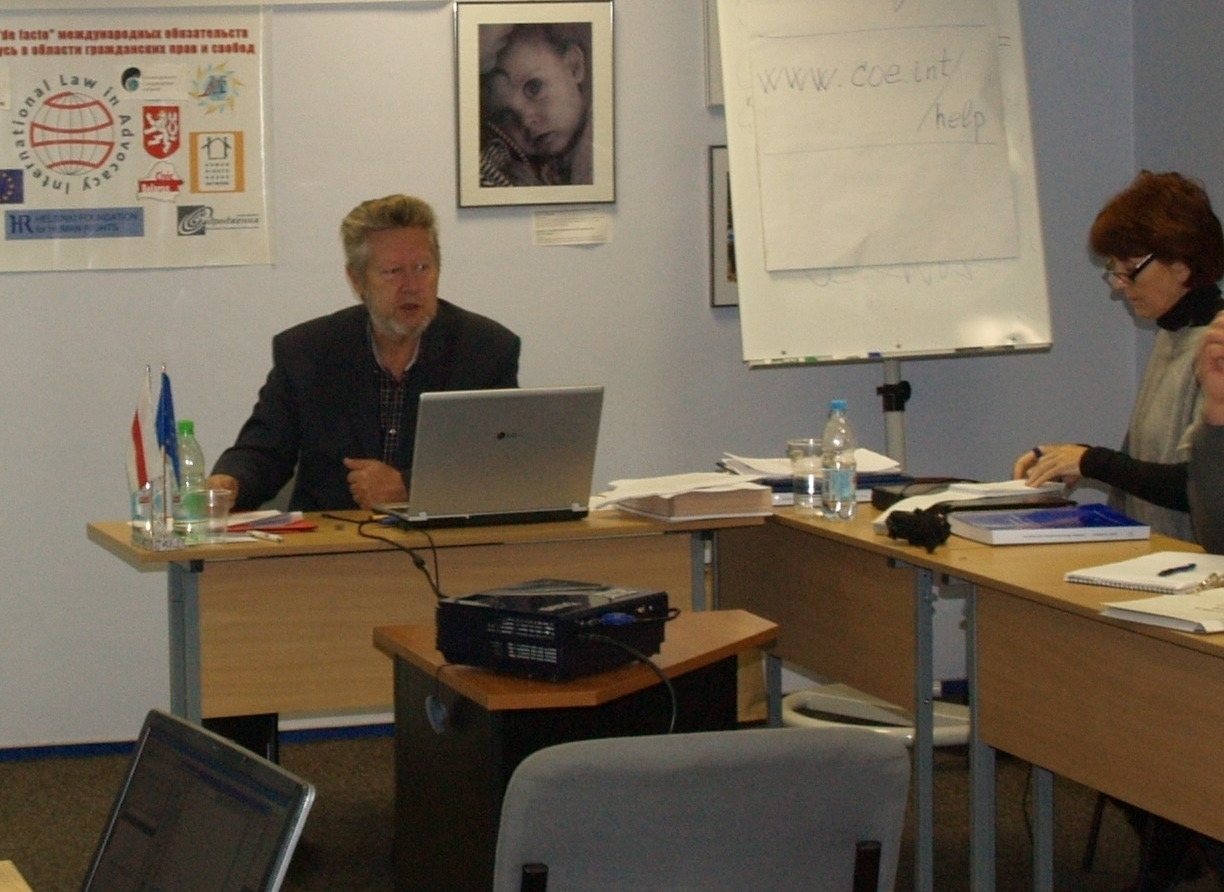Belarusian human rights defenders who attended the seminar are independent expert consultants in the field of human rights, lawyers and students of European Humanities University (EHU). The seminar addressed a number of issues, mainly dealing with Article 19 and 21 of the International Covenant on Civil and Political Rights, the statutory right to freedom of expression and right to peaceful assembly. The relevance of such issues is obvious due to their importance for the proper functioning of a democratic society, as well as a large number of violations of these rights in Belarus .
.
In the beginning of the seminar the Ambassador of the Czech Republic Alois Buchta had a speech addressed to participants.
In the first phase the seminar dealt with the methods of human rights defenders and communications to the UN Human Rights Committee, mainly on the basis of presentations and discussions, homework assignments, which were in the form of training applications to the UN Human Rights Committee, which certainly is an inherent and vital part of any human rights practices. With the help of practical examples and expert commentaries participants were able to analyze the correctness of drawing up such complaints and main stages of the Committee’s communications with the applicant. The significance of such a practice is great, as referring to a remedy in the courts at the national level, many lawyers and human rights activists do not have sufficient knowledge about the possibility of protecting human rights at the international level, in case of having used all the means of national defence. Being properly drafted at the right time is already a guarantee for the complaint to be considered admissible.
 In addition, the seminar addressed the question of the structure and functioning of the Council of Europe and the European Court of Human Rights as an effective method of protecting human rights, which was taught by an expert of the Institute of Monitoring Human Rights in Lithuania, Henrikas Mickevičius.
In addition, the seminar addressed the question of the structure and functioning of the Council of Europe and the European Court of Human Rights as an effective method of protecting human rights, which was taught by an expert of the Institute of Monitoring Human Rights in Lithuania, Henrikas Mickevičius.
We can not recall another major issue in the field of law, which was reviewed during the seminar – the principle of restricting the rights that arise under strictly defined conditions which must be accurately known by any human rights activist. First of all, the restrictions of this kind are related to the necessity, the legitimacy and adequacy in a democratic society. This is often overlooked by Belarusian State, resulting in numerous violations of human rights.
On the second day of the seminar such topics as international standards of protection freedom of expression, as well as the practical situation of violations of the law and its protection under the United Nations Committee on Human Rights and the European Court of Human Rights were touched. Interesting and intense, with heated discussions and debates, workshops were held in groups in which participants were asked to parse the specific situation and decide whether there was a violation of the right to freedom of expression.
Next issue of the violation of the right to freedom of expression smoothly flowed into the analysis of the situation de jure and de facto freedom of expression in Belarus and an examination of the UN Committee on Human Rights decisions regarding this issue.
The third day of the seminar was started by the expert and consultant of the Helsinki Foundation for Human Rights in Poland Slawomir Cybulski, who spoke on strategic litigation and ways of conducting it. Then participants were asked to prepare such a litigation, which would contain all the steps that are made by human rights defenders in order to achieve change in existing legislation in the field of human rights.
The greatest discussion among the parties arose when deciding to what can work during the strategic litigation. Some participants, convinced that it’s impossible to achieve an equitable solution in Belarusian courts, insisted on necessity of deliberate defeat in a national court, followed by public awareness campaign. Nevertheless, as it was shown later, the usage of such tactics is not always correct. Because if there were already cases that the court decision repealed the national local government decision that violated human rights, then why not refer to it in the conduct of a similar case and not to distribute it among the population? That is, through the creation of precedents and drawing public attention to them, a nationwide change in practice in this matter may be reached.
To sum up: we expected to see a group of lawyers talking about the law and human rights as it normally happens on the seminars like this. Meanwhile, we were surprised to see that more than half of the participants were not lawyers. They were representatives of various professions – from doctors to journalists. And one thing that unites them – they are all engaged in the protection of human rights. In the field of international law, the importance of such people and their human rights status is based on Resolution approved by the UN General Assembly 53/144, which declares the right and duty of individuals, groups and institutions of society to promote and protect Universally Recognized Human Rights and Fundamental Freedoms.
In our view, holding seminars to teach different people the basics of human rights protection is very effective. In this way it’s possible to improve the overall legal awareness and legal culture of the population, which is a direct prerequisite for the introduction of ideals of human rights in the Belarusian society.
4-years students of the program of “International Law”
Alena Karaliova and Volha Ramanenka


